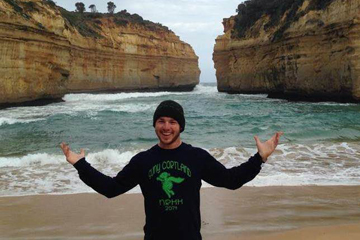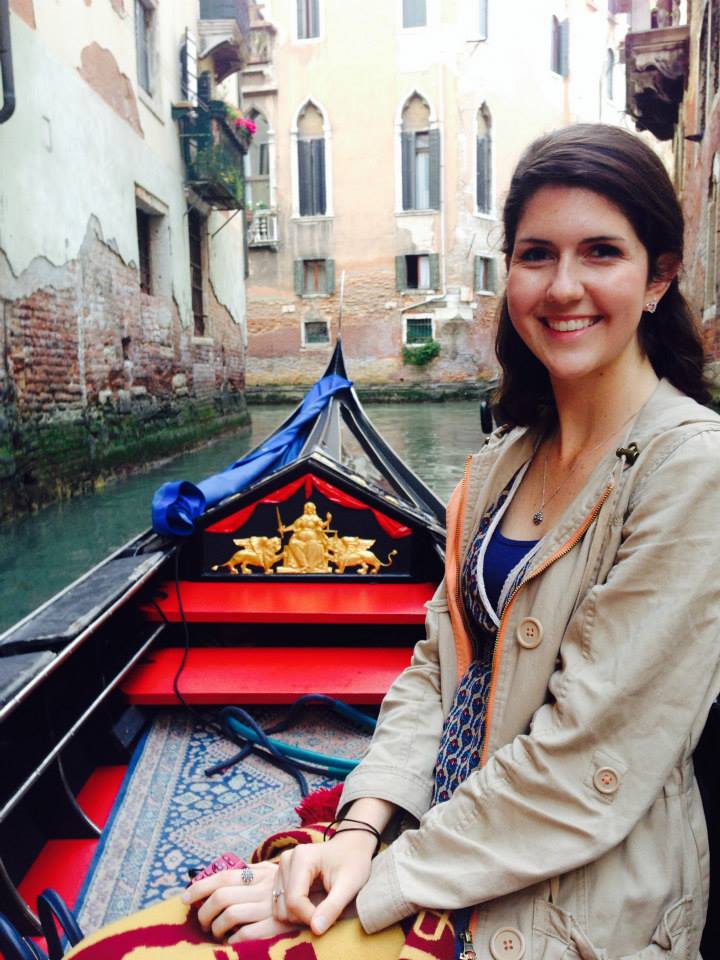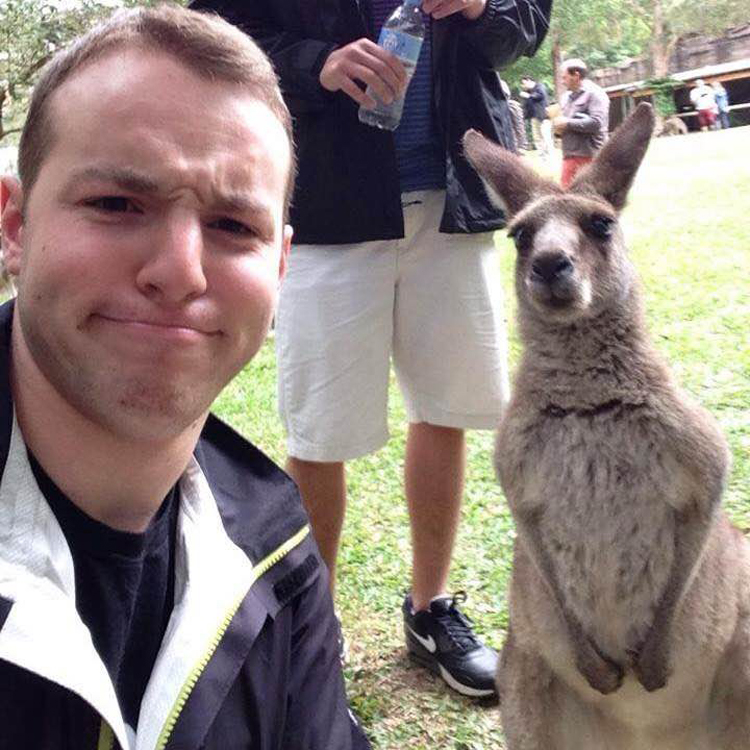
09/17/2015
“Not all those who wander are lost,” reads the line from The Lord of the Rings.
That’s certainly true for Kyle Shea ’14 and Sarah Kelly ’15, two recent graduates who both reached high levels of success at SUNY Cortland and then ventured to teach in foreign countries after their respective graduations. As seniors, both earned the SUNY Chancellor’s Award for Student Excellence, an honor reserved for the highest achievers in the 64-campus SUNY system. Both also were introduced to their new homes through life-changing study abroad travel during college.
Shea, of Walkill, N.Y., currently teaches physical education in Queensland, Australia. Kelly, who grew up in Watervliet, N.Y., and majored in communication studies and Spanish at the College, will spend the next nine months teaching English near Madrid, Spain. Each of them recently took the time to answer questions about life overseas and their penchant to see the world.
The major decision to move abroad and teach … how and why did you make it?
KS: So I walked for graduation in May 2014 and in June 2014 I left for Australia to complete the final student teaching placement of my degree. Thankfully, I was placed at Chancellor State College and was welcomed as a key member of the health and physical education pod. When I returned home in October I realized how much I truly missed Australia. So I worked through all the paperwork, paid all the fees and worked two jobs so I could afford to come back to the place that truly felt like home to me. On Aug. 1, I arrived in the Sunshine Coast and I love being back.
SK: Prior to studying abroad in Salamanca, Spain, in the spring of 2014, I had been planning to pursue graduate school immediately following graduation from Cortland. However, after studying abroad my priorities changed. I knew I had to return to Spain. I loved the slower pace of life, the opportunity to improve my Spanish skills and the ease of travel throughout Europe. I thought to myself “graduate school will always be an option in the future, but living abroad for a year may not be.” So I began to explore different ways to spend extended time in Spain, and discovered that teaching English can be one of the best routes for Americans. After researching some programs, getting advice from the study abroad advisors during my internship in the International Programs Office, and contacting another Cortland alum who decided to teach abroad last year, I discovered a well-designed program to meet my needs and help me reach my dream of returning to Spain. Now here I am!
What’s been the biggest adjustment you’ve had to make – whether it’s something related to teaching, or something cultural, or even getting used to new foods?
 |
| Sarah Kelly ’15 |
KS: Since I’ve been here before there wasn’t much to adjust to this time around. However, the biggest difference is everyone has a different attitude toward work versus play and the friendly — often witty — banter. Australians don’t work two jobs, and they often will “pay people out.” They love their time away from their jobs and they often use their time off to take trips, travel, or even just go surfing with their family rather than taking work home with them.
SK: I haven’t begun teaching yet (the school year in Spain starts Oct. 1), but I am sure that will be a big adjustment when the time comes. Although I have lived in Spain for an extended time before, it has definitely required some cultural re-adjustment once again. I would say the biggest hurdle both times has been the daily meal schedule. Spaniards eat a light breakfast early in the morning, a big lunch between 2 and 4 p.m. and then dinner around 9 or 10 p.m. Naturally I am always famished by the time lunch rolls around in the mid-afternoon! Using Spanish to communicate has also been an adjustment once again. As time progresses I’m certain there will be more hurdles that arise, but that’s all part of the experience!
Were there any SUNY Cortland experiences that helped prepare you?
KS: The student teaching in Australia helped me set up my life here. However, the physical education program prepared me better than I can imagine as a teacher, and being a resident assistant pushed me to be more passionate. The combined love of teaching and following my heart led me back to Australia and I couldn’t have done it without people in Residence Life and Housing like (director) Ralph Carrasquillo and Melissa Wilson … as well as the physical education faculty, especially Dr. (Eric) Malmberg, Coach (Jean) Wright, Dr. (JoEllen) Bailey, and Dr. (Timothy) Davis. These individuals have shaped me as a person and I am very thankful for the opportunity to learn from all of them. Learning from them made me capable to move my life to the other side of the world.
SK: Without a doubt: study abroad! It’s what inspired me to return to Spain and it has made the initial “culture shock” since arriving much less “shocking.” Hardly any of the Spanish cultural practices are completely foreign to me thanks to my previous experiences abroad.
The thing you enjoy most about your new and what you miss the most about the U.S.
 |
| Kyle Shea ’14 |
KS: I love the people here. They are extremely friendly and are always willing to give a helping hand when needing one. Being new to the area leaves you with very few support systems, however the health and physical education pod invites me to events and gives me rides home when it’s raining. It also makes it much easier to make friends when people are more willing to talk to other strangers. I honestly miss pizza from New York. You can’t buy pizza by the slice here and it is very frustrating. It’s similar to California-style pizza, so every bite is crispy. I also really miss my family, especially my mom and my brother. However, they both are extremely supportive of my choice and I needed that to move over to the Sunny Coast.
SK: What I enjoy most about Spain is, without a doubt, the slower pace of life. It is clear the people of Spain value life enjoyment much more than most Americans. For example, Spaniards rarely drink coffee on the run. For them, drinking coffee is a time to sit back, relax and enjoy good conversation with friends or family almost every day. I also really love how affectionate Spaniards are with each other. It’s hard to describe, but I love seeing the way they interact with the people they love most. I think that goes hand-in-hand with their value for tradition and respect for family — another cultural aspect I love.
Of course I miss my friends and family back home. Sometimes I want nothing more than to teleport them here to be with me. I also miss some of my favorite American foods, such as peanut butter, and my American eating schedule — lunchtime around noon instead of 3 p.m.! — but hopefully with a little more time that won’t be as much of a bother.
Thinking about your general plans for the future, do you see yourself overseas for awhile?
KS: It’s kind of open ended. Currently my plan is to teach for maybe two to three years and then maybe do a country service here. That’s where they put you in a rural town, and you teach in a remote school. Many of the staff members who have completed their country service loved their time in the rural towns and I think that I could learn a lot about teaching and myself in that environment. But, as of right now, I’m just going to focus on teaching.
SK: My plans for the future are open-ended and ever changing. I’ve tossed around the idea of staying in Spain beyond this year, but I will have to evaluate my decision from the financial perspective as well. I think it will also depend on how much I enjoy this year as a language and culture assistant in a Madrid elementary school, and what I discover about myself this year in relation to my career passion for the future. I plan to take it one day at a time and see where things go!